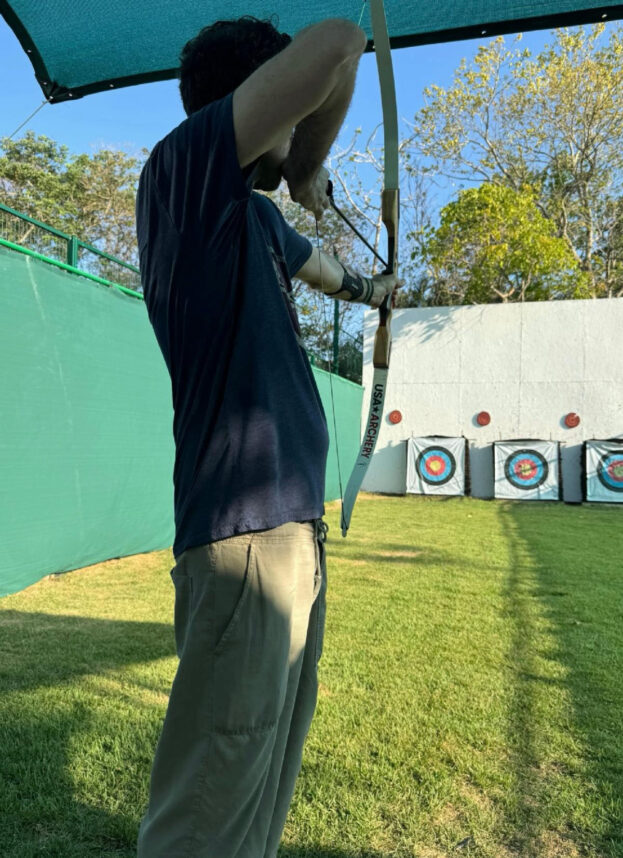I’m like most people in that I feel I’m at least a pretty good person. Not perfect, mind you, but pretty good. Nothing to be ashamed of. And then I read Haftarat Metzora and come face-to-face with my moral failings.
Haftarat Metzora occurs during the Aramean siege of Samaria, the northern Israelite kingdom’s capital. Four Israelites afflicted with tzaarat, a skin disease often (mis)translated as leprosy, sit outside the gate, expelled from Samaria because of their disease and shunned by its residents. They realize that they will receive no food from Samaria’s residents, so staying put means certain death. They thus decide to desert to the Arameans. The worst the Arameans can do is to kill them, which is what would happen to them anyway. What is there to lose?
As it turns out, God has convinced the Arameans that they are being attacked by thousands of Hittite and Egyptian armies, causing the besiegers to flee in terror. The Israelite lepers find a deserted Aramean camp. They eat and drink their fill, then seize the gold and silver and bury it for future use.
And then, something amazing happens: “they said to one another, ‘we are not doing right. This is a day of good news, and we are keeping silent! If we wait until the light of morning, we shall incur guilt. Come let us go and inform the king’s palace.’” And they do, leading Israel to see it is saved.
Let us pause in awe. The Samarians expelled the four men, shunning and rejecting them. The lepers then discovered an amazing fortune – and they told the Samarians about it. They agreed to share their good fortune with the very people who had marginalized them. No, the text does not explicitly say that they gave up their gold and silver, but that is the implication: after all, surely the residents would ask them about it, and it would not be credible for them to say that they didn’t see anything.
These men were not codependent or victims of Stockholm Syndrome: they had little compunction in deserting originally. But they transcended their original feelings and resolved to act justly even to their oppressors. That is true moral strength.
Sound impossible? Consider the case of Palden Gyatso, a Tibetan monk seized by Chinese Communists in 1959 and imprisoned for 33 years. Because he came from a wealthy family, Gyatso was singled out for beatings and torture. After a failed escape, he was ritually humiliated in front of the rest of the prisoners. Gyatso was knocked over and his face was ground into the earth while his attacker shouted: ‘The earth is the Party, the blue sky is the people, and between the earth and the blue sky there is no escape for you.’ Prisoners were subjected to savage re-education sessions, and forced to ‘confess’ their sins against the revolution. Most serious were the times when prisoners were forced to denounce each other. Often these meetings ended in mass beatings of the accused prisoner.
“I felt I was in grave danger,” he said. Well, no kidding. But what was he most frightened of?
“That I would lose compassion for the Chinese.”
Let us pause again in awe.
An interviewer asked Gyatso how he had managed to avoid hatred for the Chinese, but the monk “shook his head vigorously. I had not understood. ‘It is not that I was without hatred. Especially when I was being tortured by my guards, I had immense hatred against them because I was being hurt. But, as a religious person, I could see that those who inflicted torture did so out of their own ignorance. As a religious person I have to sit back and ask myself, what is all this? Buddhist teachings say, don’t let your calm be disturbed and do not respond to anger with anger.’” At least from the record of Haftarat Metzora, it seems as if Jewish teachings do as well. “Who is strong?,” asks the Mishnah. “One who overcomes the evil inclination.” (Avot 4:1). Gyatso and the Samarian lepers were strong people indeed.
Judaism may even go a little further. Michael Fishbane, in his Haftorah commentary for the Jewish Publication Society, shrewdly observes that “it is precisely [the lepers’] political and social marginality that puts them beyond the walls and in a position to flee to the Aramean camp.”
Haftarat Metzorah thus presents us with a profound insight: the experience of the marginalized can yield the discovery of truths unavailable to the privileged. History has borne out the Haftorah’s argument. As the historian David Brion Davis showed in his Pulitzer Prize-winning The Problem of Slavery in Western Culture, it was marginalized Protestant sects such as the Quakers, routinely dismissed as insane by their “betters,” who first recognized that slavery was not an inevitable human condition but a crime against God. More recently, it was radical, rude activist AIDS patients – perhaps the modern-day equivalent of Biblical lepers – who discovered that the Food and Drug Administration was moving disgracefully slowly in approving new drugs and led the fight to break down bureaucratic barriers, both for themselves and others.
We must not romanticize marginalization, which is degrading and brutal. Nor does social exclusion necessarily yield insight. But perhaps Haftarat Metzorah will make us think twice and resist our initial reaction to social outcasts as bizarre, unhinged, insufferable, or irrational. Listening to them, uncomfortably and awkwardly, can be a deep spiritual experience. The Light of Creation shines through them – sometimes more clearly than through us.























 More news and opinions than at a Shabbat dinner, right in your inbox.
More news and opinions than at a Shabbat dinner, right in your inbox.